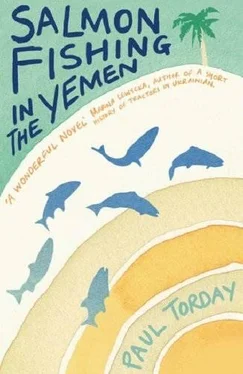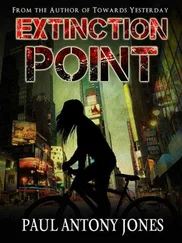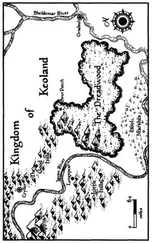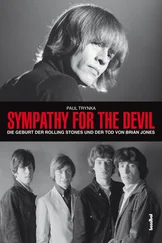Jay Vent:
Andy, you’re right that there is an endless list of problems out there that need dealing with. And no government has devoted so much of its time to global issues of the kind that you mention than mine has. But what’s so special about salmon fishing in the Yemen? Isn’t this project a different way forward? Isn’t it a form of intervention that is so much kinder and gentler and somehow…more transforming? Water in the desert? Isn’t that a powerful symbol of…
Andrew Marr:
[inaudible]
Jay Vent:
…of a different sort of progress? Yemeni tribesmen waiting for the evening rise by the side of a wadi with fishing rods in their hands. Isn’t that an image we’d rather have in our mind’s eye than a tank at a crossroads somewhere in Fallujah? Salmon smokeries on the edge of the wadis. The introduction of a gentle, tolerant sport that unites us and our Arab brethren in a new and deep way. A path away from confrontation.
All this is going to be achieved with the help of UK scientists. And that’s another thing: we’re a world leader in this fisheries science business. Thanks to the policy of this government. If we can manage to introduce salmon into the Yemen, where else can we do it? Sudan? Palestine? Who knows what new export opportunities this will open up, and not just for the scientists, but for our world-class manufacturers of fishing tackle, fishing wear and salmon flies.
So, you see, Andy, maybe it’s a little crazy as you say. And maybe, just maybe, it might work.
Andrew Marr [turns to camera, prime minister out of shot] :
Thank you, Prime Minister.
Continuation of interview with Peter Maxwell
Interrogator:
Did that interview indicate official government support for the salmon project?
Peter Maxwell:
God, no. The boss was too clever to be pinned down like that. No, what he was trying to do was create a climate of approval for the project, and the impression that he, personally, liked the idea. It went down extremely well, that cameo speech. It made the news that night and stayed top of the news for several days in one form or another.
I can’t remember the rest of the interview but I remember that bit because I wrote a lot of it the night before, sitting downstairs in the kitchen at Number 10, cracking a bottle of Australian Chardonnay with Jay. And I remember the letters we got for the next few weeks from all the fishing rod manufacturers and wader manufacturers. We could have kitted out half the Cabinet with the free samples we got. As a matter of fact, I think we did.
Jay turned the media round with that interview. We had spun the story our way. We got good leaders in the Daily Telegraph and The Times . We even got a faintly patronising but not entirely negative leader in the Guardian . Suddenly the stories about dead bodies in the Middle East were on pages four and five. The front pages were about fish, and even the review and magazine sections were all doing pieces on fishing, what a wonderful sport it was and what terrific old characters fishermen were. They even interviewed the sheikh’s fishing guy up in Scotland, Colin McPherson. I talked to him myself at one point. I’ll come back to that later. I never understood a word the man said when I met him, and I imagine the journalists didn’t either, and just made the interviews up.
The important thing I want to say here is that, suddenly, Jay started to believe his own press. He started to believe it was his idea, it always had been his idea, just as it said in the newspapers. I think he half believed, although he never came out loud and said it, that he’d gone up to Sheikh Muhammad ibn Zaidi at some Number 10 reception and cocktail party and said, ‘Muhammad, hey, have you ever thought about salmon fishing? In the Yemen?’ That happened a few times with some of the stunts I organised for Jay. He took them over, and they became his ideas, his initiatives. I didn’t mind. That was the game. Shape the story, then step back into the shadows.
Can I have another mug of tea? I’m thirsty. And some more of those biscuits?
The interview was interrupted. The witness became emotional after the consumption of custard creams and was incoherent. The interview resumed after a break of four hours .
Peter Maxwell:
It was decided at the highest level that I would stay with the project, make sure something happened and that we had a good understanding of who the players were and where they were coming from. At the right moment we would drag the story back into the headlines, get the photo opportunity for the PM, and see where we could take it next.
Nothing much happened for a bit. I asked for a briefing from the head of NCFE, a man called David Sugden. He came and gave me an hour-long PowerPoint presentation during a very busy day, and talked about timelines, and milestones and deliverables, but he didn’t actually seem to know anything about anything. So then I took him out of the loop and put myself in touch with the man who was actually doing the work, a man called Jones.
Interrogator:
Was that the first time you communicated directly with Dr Jones?
Peter Maxwell:
It was the first time we had met. I have to say I wasn’t very excited the first time I met him. He didn’t look like the sort of man who would tell many jokes. But Dr Jones made more sense than his boss. He struck me as a bit of a pedant to start with, and when he came to see me in Downing Street I gave him a hard time, just to let him know who was in charge. But after a while I realised he wasn’t so bad. It was just his manner, mixed with quite a lot of apprehension at finding himself in my office, at the very heart of power in the United Kingdom. He seemed bright enough. I think he was honest too, in a naive sort of way. Politically, he was just an innocent, of course.
After I had listened to him outlining the work NCFE had done on the project, which was mostly conceptual stuff, I interrupted him as he began to talk about dissolved oxygen levels and water stratification, and said, ‘Fred, is this going to work? Are future generations of Yemenis going to catch salmon in the wadis during the summer rains?’
He blinked and looked at me in surprise, then said, ‘I shouldn’t think so, no.’
I asked him, if that was his opinion, why we were doing all this.
He paused and thought for a moment and then he said, as far as I can remember, ‘Mr Maxwell, I’ve often asked myself that question over the last few weeks. I don’t really know the answer. I think there’s more than one answer, anyway.’
‘Try some of them on me,’ I suggested, tilting my chair back and putting my feet on the desk.
Dr Jones told me that, in the first place, while this project probably won’t succeed, it may not entirely fail either. We may achieve something, such as a short run of salmon up the wadi when it is in spate. That in itself would be so extraordinary as to justify all the effort we are putting into it-providing of course we don’t have to defend what we are doing in economic terms. And we don’t. Sheikh Muhammad is being liberal with his money. He questions nothing, he always responds to funding proposals and cost overruns by writing another cheque, and the project is now well outside original estimates.
Secondly, whatever happens, it will have moved forward the boundaries of science. We will understand many things we did not know before we started this project. Not just about fish, but about the adaptability of species to new environments. In that sense, we have already gained something.
Then, too, said Dr Jones, there is something visionary about Sheikh Muhammad. For him, this isn’t just about fishing. Perhaps, at one level, it isn’t about fishing at all, but about faith. ‘You’ve lost me there, Fred,’ I told him.
Читать дальше












